IQAir selected for the fight agains SARS in 2003
In February of 2003, newspapers began reporting a rapidly spreading atypical pneumonia. Now identified as severe acute respiratory syndrome or SARS, this highly contagious condition is caused by a new coronavirus for which there is no specific antiviral treatment. While the epicenter of the outbreak was China, the disease spread quickly across Asia and to North America (especially Canada) with a total of 32 countries eventually reporting cases.
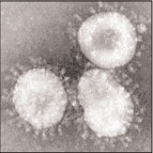 Coronavirus
Coronavirus
Until August 2003, an estimated 8422 cases have been reported – with a total of 916 deaths attributed to the syndrome. In terms of profession, healthcare workers (HCWs) were particularly affected with a total of 1725 individuals (20% of the total) becoming infected. Adding to the immense human cost, the SARS outbreak hit many economies very hard leaving them severely damaged as tourism and other travel-related industries took a nosedive. Estimates of the financial cost of SARS have varied from a conservative figure of US$ 30 billion according to the World Health Organization (WHO) to US$ 150 billion globally. Some experts noted that even this high figure is likely to be a gross underestimate. Thus, the effects of SARS are now regarded as the affected regions’ own "September 11", and the aftershocks are still unfolding.
WILL SARS RETURN?
In an unprecedented effort to solve the SARS mystery and prevent its spread, the WHO, the Centers for Disease Control (CDC) and many other organizations have brought hundreds of people together. On July 5, 2003, the last two countries (China and Taiwan) were finally taken off the list of areas with recent local transmissions. At this moment in time, the most pressing question is whether SARS will return. Like the Ebola virus, the SARS virus could hide in some animal or environmental reservoir, only to resurface once the conditions again mature for the spread to humans. According to the WHO, "SARS might also behave like many other respiratory diseases of viral origin, dying out as heat and humidity rise and returning when the season turns cooler.
PREPAREDNESS IS THE BEST DEFENCE
Much like other respiratory illnesses, SARS is spread by close contact, when a person infected with SARS contaminates the surrounding air with tiny droplets of infectious matter. Someone in close proximity of the infected person can then become infected by breathing in the contaminated air. However, scientists are also considering other possibilities of transmission. According to the CDC, "it is possible that SARS can also spread more broadly through the air". Since there is no specific antiviral treatment for SARS, the most effective strategy controls. While it is the WHO’s first objective to seal off opportunities for the international spread of this deadly disease, many health-care institutions are looking for additional infection control measures that will help them to contain infections in the event that the coronavirus once again flares up in an outbreak.
THE HONG KONG CASE
One of the institutions that were particularly keen to implement special engineering controls as an additional precaution strategy in the fight against SARS was the Hong Kong Hospital Authority (HKHA). The authority currently manages 43 public hospitals, 47 specialist outpatient clinics, and 13 general outpatient clinics. During the SARS crisis, Hong Kong was one of the worst affected areas with 1755 reported SARS cases (376 of which concerned HCWs) resulting in a total of 300 deaths. In view of these huge losses, the HKHA was determined to find a way to effectively contain the SARS virus and protect their HCWs in case the disease should resurface.
THE EVALUATION PROCESS
In order to find the most efficient, reliable, flexible and cost-effective solution, the Electrical and Mechanical Services Department (EMSD) of the Hong Kong Government performed rigorous tests on behalf of the HKHA. They evaluated the suitability and performance of many filtration systems, including IQAir®. With the help of a laser particle counter, the EMSD tested the actual filtration efficiency of each filtration system.
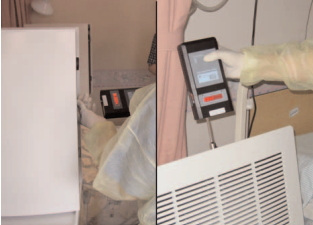
A Senior Engineer of the EMSD assesses the actual filtration efficiency of two air cleaners with a laser particle counter. The majority of conventional air cleaners failed the efficiency test.
The efficiency tests revealed that most of the air cleaners failed to remove airborne particulates with the required actual efficiency in excess of 99.97% for particles of 0.3µm and larger. With its certified and independently type-tested filtration efficiency, IQAir® passed this test. After the preliminary selection process, it was the EMSD’s aim to select an infection control system that could be put into action in a matter of minutes and that would be able to effectively limit the threat of airborne disease transmission from a SARS patient to health-care workers by providing reliable and certified actual filtration performance.
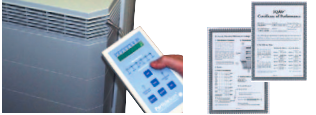
Each IQAir® HEPA filter system is individually tested for filtration efficiency and air delivery. The actual test results are documented on a numbered test certificate.
THE SELECTION
Thanks to the professional effort of a Hong Kong-based authorized IQAir® dealership and IQAir®’s previous experience in the field of hospital infection control (see IQAir® press release "Decentralised Airborne Infection Control in Health-Care Facilities"), IQAir® was able to develop a tailor-made SARS control solution for the hospitals managed by the HKHA.
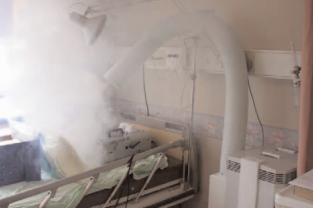
Testing the IQAir® in location. Artificial smoke is generated on a hospital bed and then captured at the source with the help of the IQAir® FlexVac™’s flexible suction arm.
After weeks of testing and the installation of several trial systems, the HKHA finally chose IQAir® as the only mobile filtration solution for SARS patient rooms. To equip over 20 hospitals managed by the HKHA, several hundred IQAir® systems are required for this project alone. The selected filtration system consists of an IQAir® model connected to the FlexVac™ mobile source capture system and a special flexible OutFlow™ air exhaust that enables the filtered air to be directed.
In the case of a SARS emergency, the self-contained mobile IQAir® filtration system can immediately be positioned next to the SARS patient’s bed. The flexible suction arm is positioned near the patient’s face to capture airborne droplets which are expelled by coughing and sneezing. The contaminated air is then filtered in a 3-stage filtration process. At the final filtration stage, IQAir®’s independently type-tested HyperHEPA® filter removes even the tiniest of airborne microorganisms, including the SARS virus, with efficiency in excess of 99.5%. As a result, the risk of infection within the patient’s room can be greatly reduced, thus providing a safer working environment for health-care personnel and limiting the risk of spreading the disease.
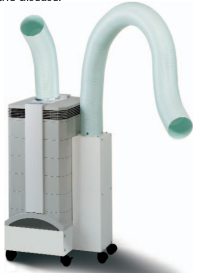
The customized IQAir® filtration solution for the Hong Kong Hospital Authority combines an IQAir® filtration system with the FlexVac™ source capture kit and special flexible OutFlow™.
It is clear that vigilance for SARS must be maintained because the resurgence of the virus is possible. As a world-leading manufacturer of mobile air cleaning systems, IQAir® feels honored and privileged to be able to play an important part in providing professional air cleaning solutions for the fight against SARS and other airborne infection control challenges.
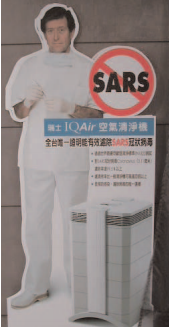
Taiwanese IQAir® display.
IQAir® sincerely thank all those individuals who have contributed to making this project possible. Our particular thanks go to David Mak and his team.

